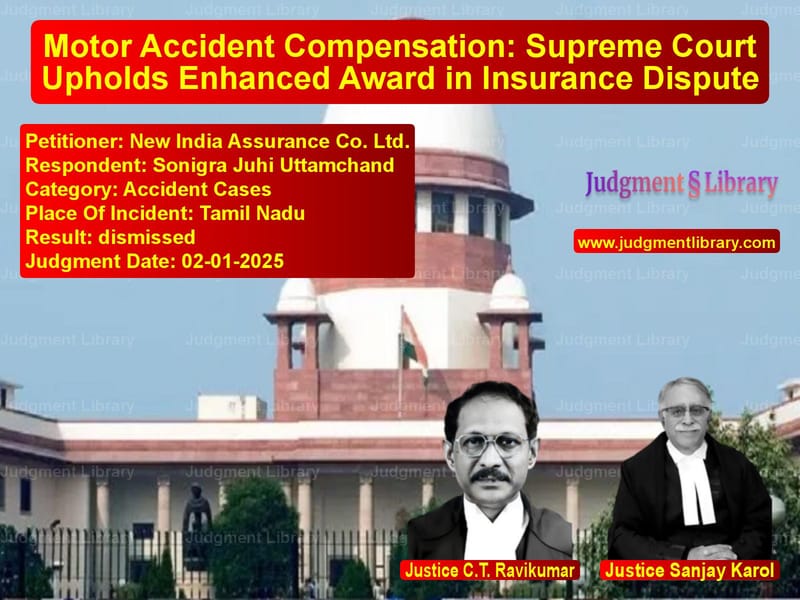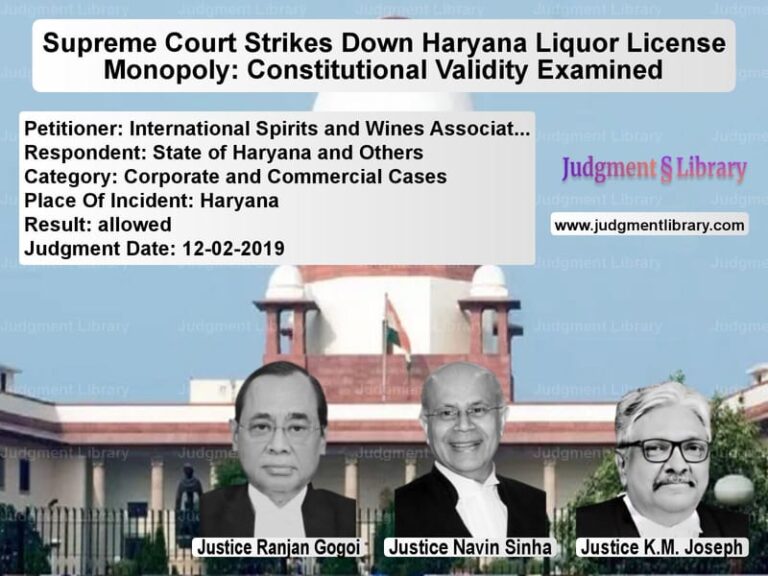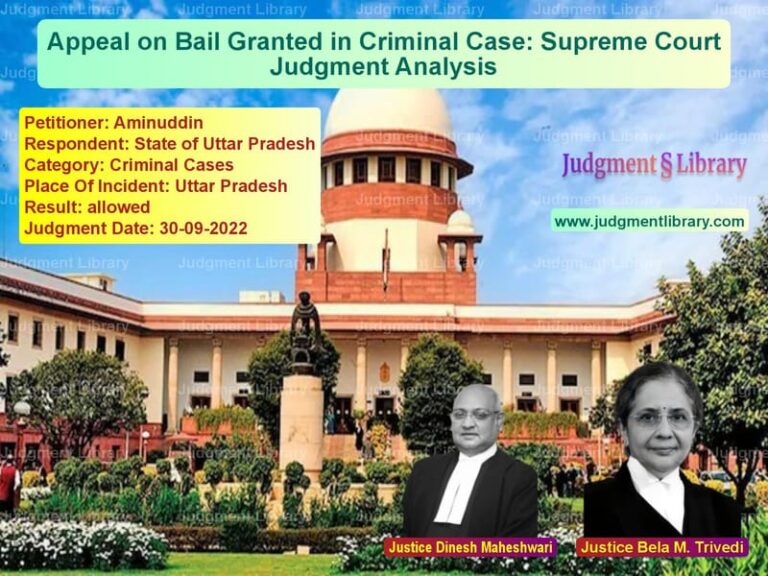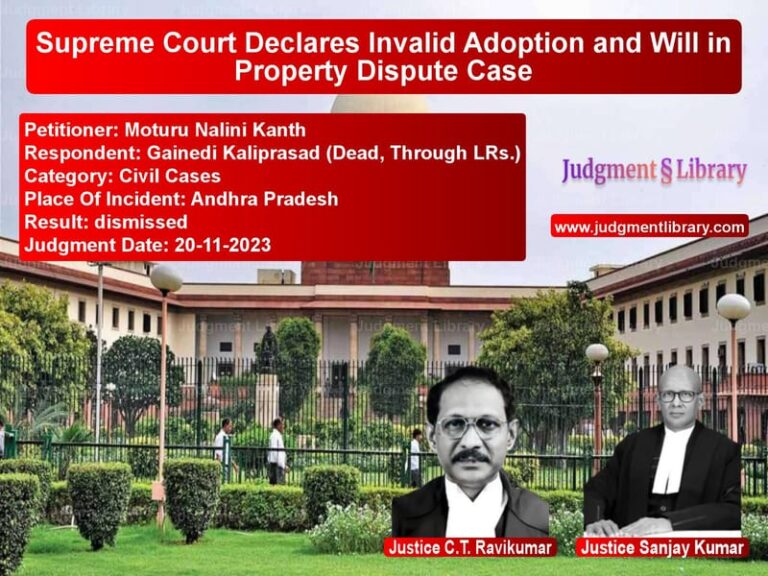Motor Accident Compensation: Supreme Court Upholds Enhanced Award in Insurance Dispute
The Supreme Court of India recently ruled in New India Assurance Co. Ltd. v. Sonigra Juhi Uttamchand, a case involving compensation claims for a tragic motor vehicle accident. The Court upheld the enhanced compensation awarded by the High Court, dismissing the insurer’s appeal for reduction and the claimant’s plea for further enhancement. This judgment provides critical insights into the principles of just compensation under the Motor Vehicles Act.
Background of the Case
The case arose from a fatal road accident on June 20, 2007, in which the appellant, Sonigra Juhi Uttamchand, lost her parents and younger brother. The accident occurred when a Tata van, insured with New India Assurance Co. Ltd., negligently collided with a stationary auto-rickshaw carrying the deceased. The appellant, as the legal heir, filed three Motor Claims Original Petitions (MCOPs) seeking compensation.
Key Facts
- The driver of the Tata van was found negligent, making the insurer liable for compensation.
- The Motor Accidents Claims Tribunal (MACT) awarded:
- ₹14,78,000 for the father’s death
- ₹13,33,936 for the mother’s death
- ₹2,45,000 for the brother’s death
- The High Court increased the awards to:
- ₹30,58,000 for the father
- ₹16,34,000 for the mother
- ₹5,00,000 for the brother
- The insurer appealed for a reduction, while the claimant sought further enhancement.
Legal Issues Raised
Insurer’s Arguments
The insurer, New India Assurance Co. Ltd., argued that:
- The High Court erred in not deducting one-third of the deceased’s income for personal expenses.
- The income estimates were arbitrary, lacking documentary proof.
- The compensation under ‘conventional heads’ exceeded the limits set in National Insurance Co. Ltd. v. Pranay Sethi.
Claimant’s Arguments
The claimant, Sonigra Juhi Uttamchand, contended that:
- The income of her deceased parents was underestimated.
- Future prospects were not adequately considered.
- The loss of parental support and companionship warranted a higher compensation.
Supreme Court’s Observations
The Supreme Court, comprising Justices C.T. Ravikumar and Sanjay Karol, carefully analyzed the case and addressed the insurer’s and claimant’s contentions.
Deduction for Personal Expenses
The Court held that the High Court erred in not deducting one-third of the deceased’s income as per the guidelines established in Sarla Verma v. Delhi Transport Corporation. However, given the minor impact on the total compensation, the Court decided against modifying the award.
Income Estimation and Future Prospects
The Court observed that while the claimant had submitted only xerox copies of the Income Tax Returns, the Tribunal and High Court had reasonably estimated the deceased’s income. The Court upheld the High Court’s decision to enhance the father’s income from ₹12,000 to ₹18,000 per month and the mother’s from ₹8,000 to ₹9,000.
Furthermore, the Court reiterated the principle in Pranay Sethi that future prospects should be considered, even for self-employed individuals. However, since the High Court had already made reasonable enhancements, the Court found no need for further modification.
Compensation Under Conventional Heads
The insurer argued that the High Court awarded more than the ₹70,000 cap set in Pranay Sethi for loss of estate, loss of consortium, and funeral expenses. The Court acknowledged this deviation but refused to alter the award, noting that the High Court’s ruling predated the Pranay Sethi decision.
Compensation for the Deceased Brother
The Tribunal had awarded ₹2,45,000 for the death of the claimant’s 10-year-old brother, later increased to ₹5,00,000 by the High Court, citing Kishan Gopal v. Lala. The Supreme Court upheld this enhancement, emphasizing the emotional loss suffered by the claimant.
Final Judgment
The Supreme Court dismissed all appeals, affirming the High Court’s enhanced compensation as just and reasonable.
- The insurer’s appeal for reduction was rejected.
- The claimant’s plea for further enhancement was also denied.
- The compensation awarded by the High Court remained unchanged.
Implications of the Judgment
This ruling reaffirms key principles in motor accident compensation:
- Courts should adhere to standard deductions for personal expenses.
- Future prospects must be considered for self-employed victims.
- Just compensation should account for both economic and emotional losses.
- While legal caps exist, courts can exercise discretion based on case specifics.
The decision ensures a fair balance between insurers’ liability and victims’ rights, reinforcing the principle of ‘just compensation’ under the Motor Vehicles Act.
Petitioner Name: New India Assurance Co. Ltd..Respondent Name: Sonigra Juhi Uttamchand.Judgment By: Justice C.T. Ravikumar, Justice Sanjay Karol.Place Of Incident: Tamil Nadu.Judgment Date: 02-01-2025.
Don’t miss out on the full details! Download the complete judgment in PDF format below and gain valuable insights instantly!
Download Judgment: new-india-assurance-vs-sonigra-juhi-uttamch-supreme-court-of-india-judgment-dated-02-01-2025.pdf
Directly Download Judgment: Directly download this Judgment
See all petitions in Road Accident Cases
See all petitions in Compensation Disputes
See all petitions in Motor Vehicle Act
See all petitions in Judgment by C.T. Ravikumar
See all petitions in Judgment by Sanjay Karol
See all petitions in dismissed
See all petitions in supreme court of India judgments January 2025
See all petitions in 2025 judgments
See all posts in Accident Cases Category
See all allowed petitions in Accident Cases Category
See all Dismissed petitions in Accident Cases Category
See all partially allowed petitions in Accident Cases Category







